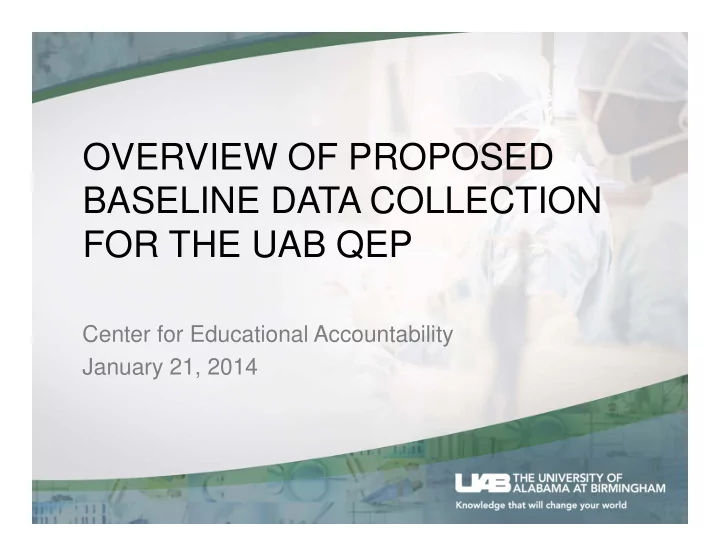

OVERVIEW OF PROPOSED BASELINE DATA COLLECTION FOR THE UAB QEP Center for Educational Accountability January 21, 2014
Assumptions • The QEP focuses both on team-focused pedagogies in the classroom or service learning environment AND on developing team skills and dispositions
Are We Measuring Two Things…or One? Team ‐ Team ‐ focused performance Pedagogy Training (TFP) (TPT)
Assumptions (cont.) • While the QEP does not need to apply to all units on campus, it is important to get a cross- campus perspective at baseline • Data for the QEP should be gathered from faculty, students, alumni and employers • Evaluation of the QEP must focus on changes in context, process, and outcomes
Definitions • Context: The general climate of the university relating to teaming and team-based pedagogy evidenced by the density of team-focused pedagogy, team experiences in service learning, student and faculty attitudes about team-based learning, and the extent to which the units report a focus on team skills and team performance. • Process : The activities that faculty engage in to deliver team-focused pedagogy and promote team skills. • Outcomes: The effects of team-focused pedagogy and teaming on learning as well as student, alumni and employer satisfaction
Goals: Context and Processes • Describe the nature of the UAB infrastructure that currently supports team-focused pedagogy and team outcomes for students • Describe initial extent and characteristics of team- focused pedagogies and team performance training used across campus (e.g., Faculty and student reports of instructional methods of team-focused pedagogies and team performance training used in classes and service learning) • This data will enable the university to monitor the changes in support and pedagogical strategies that occur during the course of the QEP
Goals: Context and Processes (cont.) • Describe faculty and administrator perceptions of features that serve as barriers and enablers of team- focused pedagogies and team performance training. This data will be useful in identifying strategies within and across units to support TFP and TPT and monitoring adoption of QEP. • Describe perceptions of gaps between actual and ideal implementation of teaming (TFP and TPT) within units and describe perceived obstacles to resolving the gap. This data will enable the university to identify units that will perceive QEP efforts most favorably (high need/low implementation).
Goals: Outcomes • Describe baseline levels of core learning outcomes – Undergraduate learning outcomes on the Profile – Retention of learning in a sample of undergraduate and graduate courses • This data will be useful, in part, to document the contribution of the QEP to student learning outcomes (Do units/courses that adopt teaming demonstrate greater freshman to junior gains and greater spring to fall retention?)
Goals: Outcomes (cont.) • To summarize currently available alumni assessments of satisfaction with preparation related to teaming. This data will determine where gaps in collection exists across units and provide initial baseline status. • To summarize current perceptions of employers of UAB graduates regarding the role of teams in their organizations and perceptions of UAB graduates to participate effectively as team leaders/team members. This data will: (a) engage community stakeholders in the QEP, and (b) provide baseline information to the unit and university regarding the perceived importance of team skills for graduates.
Methods: Data from Administrators • Surveys of all chairs and deans regarding: (a) current levels of allocation of resources to team- focused pedagogy and team performance training, (b) perceived importance of teaming to disciplines within school/department, (c) perceived enablers and barriers to implementation, and (d) perceived level of adoption. (February 28th)
Methods: Data from Faculty • Qualtrics survey of all teaching faculty describing current practices of teaming in courses taught this semester (structure, curriculum, assessment), attitudes toward teaming and factors which enable or impede team-focused pedagogy. (Disseminated February 28th).
Methods: Analysis of Existing Data • Aggregation of extant process and outcome data from university-wide and unit-specific assessments (March 15 th ): – NSSE/FSSE – Profile – Alumni assessments (program or department specific) regarding teaming
Methods: Student Learning Retention Pilot • Qualtrics-based learning retention pilot study (online administration in early April and late August) – Undergraduate and graduate classes sampled – Students compensated to participate (Visa card at completion of follow-up test) – Sampled multiple-choice items that are not “secure” but are content valid
Methods: Student Reports of Exposure to Teaming in Classes and Service Learning • Student reports of degree of team-focused pedagogy or team-performance training embedded in classes (amended IDEA survey or similar surveys) (June 30) AND/OR • Standardized student survey related to teaming (team-focused pedagogy, team-performance training). Requires adoption of a survey, determination of a sampling plan, administration, scoring and reporting. (May 31)
Methods: Gathering Baseline Portfolio Evidence of Teaming • Units compile a portfolio of assessments that are used to evaluate team-focused pedagogy, team performance training, and their effects on student outcomes (May 1) • NOTE: This task may be assigned to units selected for engagement in the QEP rather than for all units.
Method: Baseline Employer Data • A sample of department-specific studies of employer attitudes toward teaming and satisfaction with preparedness of majors regarding team skills (e.g., focus group or survey of advisory groups) (May 15)
Other Evaluation Tasks • Adoption of an observational and/or self-report protocol related to team-focused pedagogy, etc. • Establishment of alumni and employer databases to track satisfaction • Incentives for faculty, students and alumni to participate • Sampling of courses for testing regarding retention of learning
Recommend
More recommend